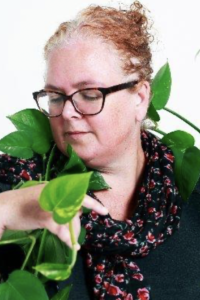SEA Centre for Innovation staff at Leiden University: Tanja's Story

As long as I can remember I’ve been a nature enthusiast, and activist, something my mother and grandmothers were before me. As a child I collected money for birds, and seals and participated in any other nature campaign greenpeace or WWF organised for the young. Growing up I wanted to be a biologist, and later a journalist on board a Greenpeace ship. Instead, after studying History at Leiden and a long meandering road through several companies, I have found a home of like-minded, creative, and world saving enthusiasts at the Centre for Innovation of Leiden University for the last 8 years.
At some point dubbing ourselves “The Green Musketeers”, me and my colleagues have created several sustainable projects grounded in our own conviction that there are many ways to educate people about the Sustainable Development Goals of the United Nations. Our Massive Open Online Courses (MOOCs), which Leiden has published on Coursera and FutureLearn, have covered such topics as recycling of metals, evolution today, the protection of (natural) heritage and the connection between nature, well being and mindfulness.
Indeed, for the very popular course De- Mystifying Mindfulness the Centre of Innovation built the Mindful Garden at the Schouwburgstraat. The Mindful Garden is a haven of biodiversity in the city centre, and serves to promote several other SDG’s as well, as we narrated in this video. It is also just a place where we like to hang out, and the garden is something that I have missed most during these long months in lockdown. We hope to promote the concept of having community gardens and other forms of green spaces in university buildings in the coming years, as we slowly return to the office. Meanwhile, the course De Mystifying Mindfulness will feature a full module on the connection between mindfulness, nature and land in its latest update this April 2021.
Digital technology can be used for more than just MOOCs, Digital Education and Twitter. For decades I have used the internet to keep in touch with people from all over the world in online communities. We now know what an important role digital technology has played in the pandemic, keeping us together, and enabling us to continue campus education, however imperfectly. However it can also be used to reduce our carbon footprint by travelling less, and be more inclusive at the same time. Indeed it was in a discussion about sustainability and digital technology that I met Leiden Astronomer Leo Burtscher, and together we organized a hybrid event in february 2020 (what timing!). I look forward to this concept of sustainable digital events being promoted more at Leiden University. Virtual meetings and digital events are here to stay, though as with all innovation this is an iterative process of improvements on the prototype for years to come.
At that February, just pre-pandemic, event, in conversation with members of the Leiden Green Office (LUGO), the idea for an online sustainability community for Leiden staff was born, even though we did not yet have the proper digital infrastructure available to us.That changed within months with the introduction of MS Teams. LUGO rightly grabbed at the chance, and in October the Sustainability Network was born, moderated by the ever present LUGO staff. It is acommunity of action, first of its kind at Leiden, where staff from Leiden University from all faculties, centres and other corners can come together and discuss both quick fixes and long term solutions that make our workplace a better, greener, more sustainable place. The network already has 140+ members, and seen many successes such as recommendations for more sustainable corporate gifts, providing an energy label in the catalogue of working from home devices like laptops and bringing together people who teach on sustainability. It brings together a coalition of the willing that I am very enthusiastic about. I hope to see you there!


0 Comments